At Wicked Leeks, we aim to focus on stories of hope, resilience, innovation, and empowerment. But part of our mission includes never shying away from the unprecedented, escalating challenges faced by British farmers, and questioning the factors that have brought us here. So when Liv James got in touch with her story – one of a one-acre, no dig market garden, in North Devon – the challenges and successes she faced mirrored those faced by thousands of other growers in the UK today. We share her words below, as written, and will share more as part of our new ongoing series of Farm Stories, here at Wicked Leeks.
According to Riverford research, 61 per cent of farmers fear having to give up their farm in the next 18 months, writes Lizzie Rivera, for Wicked Leeks. And for us, that fear has become a reality. We are humbly joining the farmers that have had to “give up” in an unforgiving climate. Earlier this year, following a family death, we were pushed into making the choice to leave the farm. Despite the gravity of this decision, it has then opened space for reflection and asking ourselves: does this market garden really work for our finances, health and family?
Henry and I have been at Down Farm for eight years; me farming for 10 and Henry has been growing veg for the best part of the last 20 years. Down Farm is a 1.5 acre organic market garden, in North Devon, where we have grown 50+ varieties of veg using hand tools, that is sold within 30 miles of the farm. We are now shutting up shop, moving off the family farm, changing our careers and identities. On reflection, we probably have been heading down this path since we started and I’m not sure our business (in its current format) would ever have succeeded in the traditional economic sense.
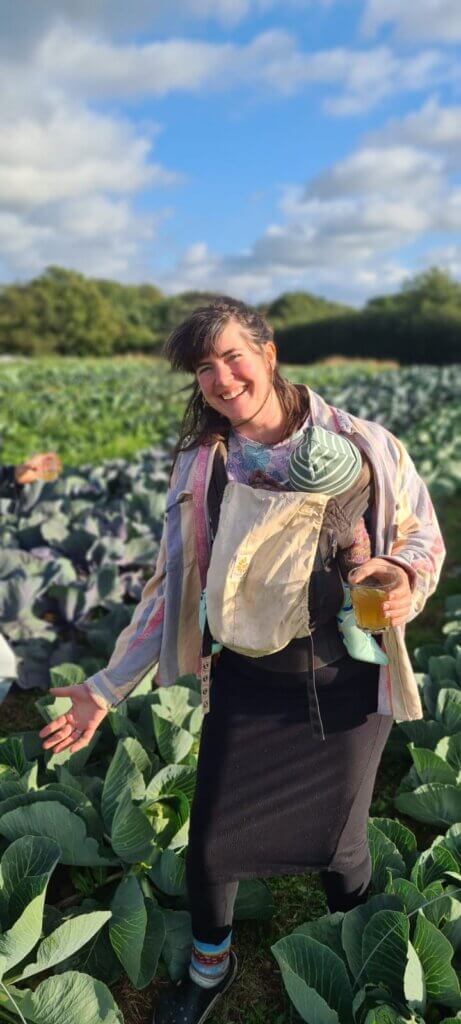
Our life and business has been incredibly rich, just not monetarily. We started our growing journey from a place of wanting to do right by the world – to produce nourishing, healthy food that was accessible for people, using a small piece of land to produce a lot of food, whilst also leaving space for our wildlife to flourish. We had big dreams of a community hub; a thriving place of business and networks. That journey is now coming to an end.
The challenges we are facing are a cluster of personal and external circumstances. Farming is a fragile industry: this season has pushed us out of balance resulting in the inability to bounce back. And while this “failure” of our business is by no means the path of all market gardening businesses, there are some themes to consider in our industry and how as a nation we can sustainably grow food for our people that does not sacrifice the wellbeing, health, and lives of those doing it, or the environment. Was Down Farm Market Garden always doomed from the beginning or could we have made some changes to save our business from collapse?
Scale: the hand tools and/or no-dig model and boundless optimism
When I started growing in 2013, social media was not as prevalent as it is today and our inspiration was JM Fortier, the “Six Figure Farmer” and Charles Dowding, the no-dig guru, amongst other field scale growers (Iain Tolhurst; Eliot Coleman). With hindsight it was naive to use a JM’s farm in Canada as a basis for success when the circumstances are not comparable to the UK, and a method (no-dig) that is designed for a home garden. We were barely connected to other farms, who could have provided meaningful inspiration. My experience was from volunteering, Henry’s experience included his Soil Association apprenticeship and work on larger farms (10 acres+) using tractors.
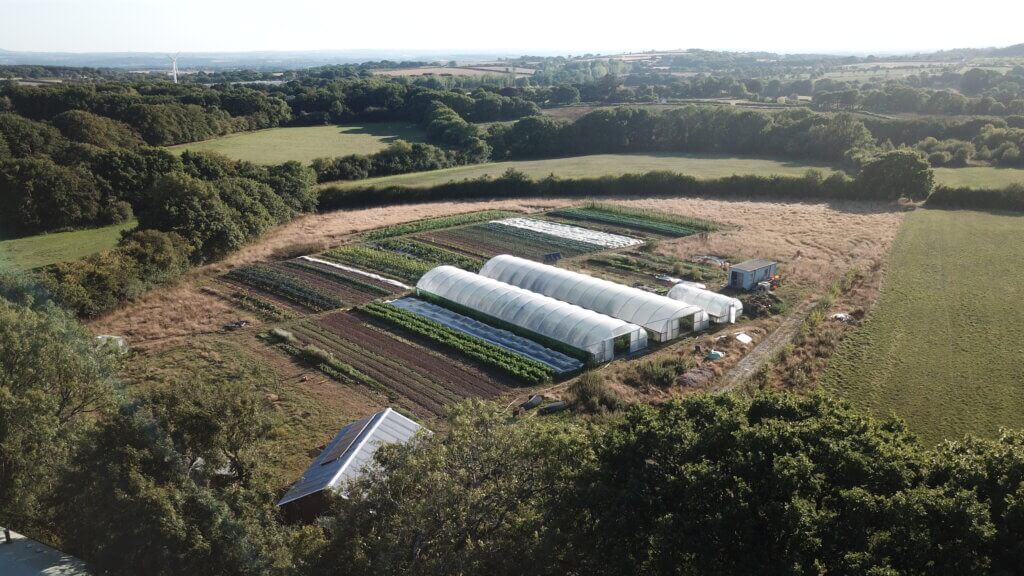
We knew a little about no-dig growing (a type of going which avoids soil inversion, to preserve soil structure and therefore health) and blindly dived into it as the method for our market garden. We didn’t have the money to buy a tractor but growing on a human scale felt achievable. We were also idealistic environmentalists who wanted to run a business with limited reliance on fossil fuels. I was 25, at the time; educated, relentlessly optimistic, fit and healthy, and had all the time in the world. I had never failed at anything and lived by the adage of a meritocracy the harder you work the more successful you will be.
At our no-dig peak, we grew one acre of vegetables with zero machinery (except our own bodies). This used tonnes of compost (questionable environmental consequences), was physically exhausting, and required a six to seven day week commitment in the peak season. Fast forward again to the present day; my body has grown two children, I have suffered a major shoulder injury and I am 10 years older. Henry again is 10 years older, suffers with shoulder issues and neither of us is quite as enthusiastic about lifting 20kg+ as we once were!
On top of this, the hours of the day are bookended by our family commitments. To reduce the load we progressed our no-dig model to a minimum tillage model (plowing new land then mowing and rotavating as necessary) using a BCS 2-wheel tractor which allowed us to reduce compost use, increase the use of green manures, and do the ground work with a machine instead of our bodies (increasing our relative capacity overall). However, our two-wheel tractor still remains limited in its capacity in relation to a 4-wheel tractor. We found that we could grow a bit more produce, but never enough to satisfy the demands of our box scheme and markets, meaning our margins were squeezed through having to buy in supplementary produce.
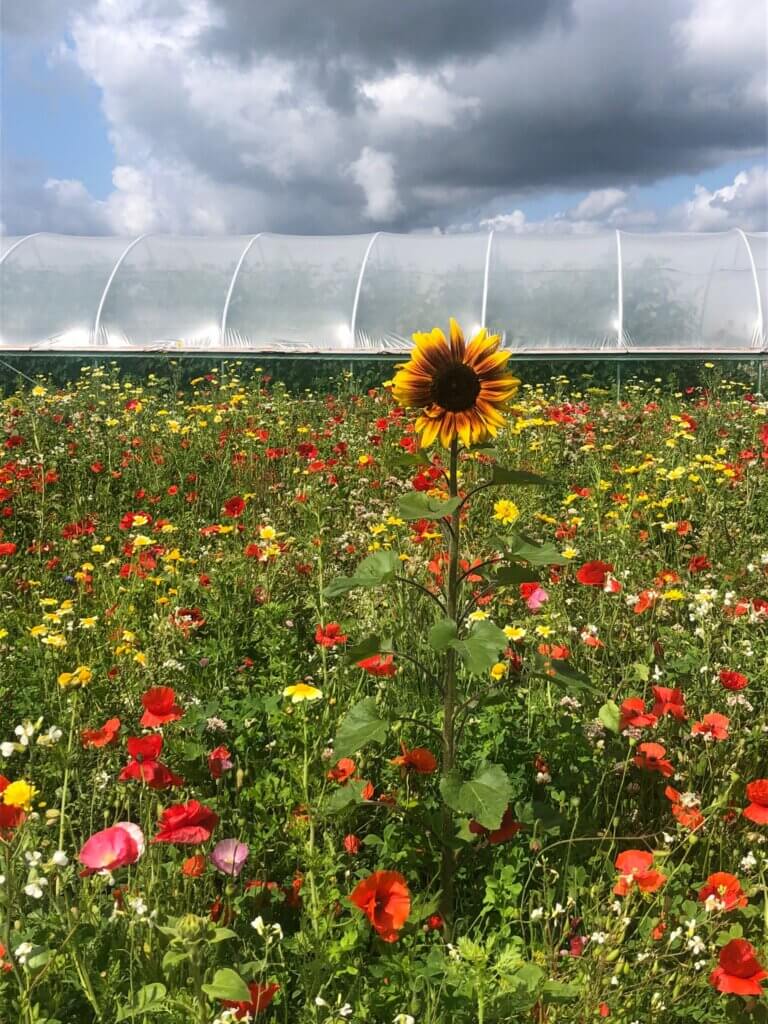
On reflection we chose the wrong scale and growing style to meet our business needs. The boundless optimism compounded our lack of thought for the factors that have a huge impact on business: scale and therefore sales model. However, It shouldn’t be a question of go big or go home – this way of thinking simply increases the burden on farmers through debt, and on the environment, as farming practices intensify.
Our business model
After we figured out how to grow veg, we then had to figure out how to sell it. We started with local sales through restaurants, shops, and a small veg box scheme. We added markets early on to the mix and increased our box numbers to about 50 a week. This volume has been more than we can produce on our scale which led us to buying in about 50 per cent of the produce we sell. We are finishing our business with sales of £100,000/year split between local shops (10%), markets (45%), and boxes/direct to customer sales (45%), with very little profit. Although we have generally covered our costs, our labour has largely been unaccounted for, and there is little room for increasing our salaries. It feels like we exhausted the “local” market in terms of farmers’ markets, shops, and restaurants, leaving the only potential growth in veg boxes or “retail”.
We never started farming to run a retail business and we struggled with juggling the hats. We are competing with the industry giants, with half-baked skills and resources. Given veg boxes remained the only area left for growth in our business/growing model I wanted to know what scale we would need to be on to “make it work” so I examined the figures:
Weekly income – between £700 to £1000
Average 40-50 veg boxes, 10 bespoke orders and 10 fruit boxes
Weekly expenditure – between £500 to £600
Including staff for packing and delivery (12 hours), fresh produce (50% contents) packaging, software fees, card fees, fuel.
Depending on the week, the average profit for 50ish veg boxes is between £150 to £450 but that doesn’t factor in any of our time for admin (a lot) or picking (even more). If we were to continue at this rate, I doubted that our model would be scaleable. Getting to 50 box customers has taken us years and I’m not convinced this door-step delivery model works in our area of rural Devon, with our lack of infrastructure. How many boxes do we need to sell to make a decent income? With reflection, our business model would have needed to be restructured to work for our particular circumstances, including regional/national wholesale outlets, and reducing our range (which feels impossible when growing for boxes, which are all about variety), and to focus on what grows well on our piece of marginal land.
The people + the power
Before we knew it, we were at a scale where it would have been helpful to have had extra hands in the field, especially after having children which massively reduced our capacity. Our business requires 2-3 full time staffers (and then some) to run. We started on the seasonal staff treadmill which is unsustainable. We tried to turn our business into a cooperative to solve this staffing issue – bringing in business partners, so there were four of us to run our business. But we both had young families and running a business on a flat structure takes commitment. Any power imbalance finds its way to the surface and it needs time to address. With children and the pressures of market gardening we did not have the time to make it work and it sadly came to an end. It is amazing and rewarding working with friends as a team, but it is equally challenging when working through conflict. The time it took to work on a flat structure may have been better invested in remodeling our growing or business model. But hey, we tried!

I strongly believe working together is incredibly important. Look at the Isle of Eigg that has celebrated over 25 years of community ownership where the Island’s Trust “manages the island’s development for residents”. It doesn’t feel like farming is something that should be done alone, and our business model could have benefited from working with others so we could share the cost of production, labour, inputs and help create a larger market. But most farmers are trapped in a system of private land ownership built on individualism and mechanisation.
Land + ownership
Not many other industries are as deeply rooted to a place as farming, and if the security of ownership fails here, what chance is there of success? Henry’s family bought the farm in the 70s. They had no interest in farming, it just “made financial sense”. Fast forward to the present day and the family has grown in numbers, while the value of the land has increased disproportionately to wages. We thought it was a priceless privilege to move back to a family farm – giving us access to a home, infrastructure and woodland. I never considered it to be a “risk” and we naively never considered very important factors such as what food production the land was best suited for, what scale would be appropriate, is there a sufficient market for our produce, is the land secure?
We followed a dream to the land that was available to us. Despite these rather large and unanswered questions, we set up our one-acre market garden in 2016. Fast forward to 2024, and all our savings have been ploughed into the land and house, and we are in the midst of an inheritance mess sinking money we don’t have into the bottomless pockets of the legal system. This steered us to the difficult decision to shut up shop before we are left without a home or livelihood.
For me, land shouldn’t be an asset that is parceled up and sold off; there is a deeper connection to the land we are part of it and it is a part of us. However it is a commodity and the “price of land means there are very very few people who can bid for [land]” explains Col Gordon in the Landed podcast “which means we get locked into a pattern of consolidation, intensification and concentration of ownership” – continuing the shift of power from the small to the large.
My heart is aching for the land we are leaving behind. Whilst there remained a glimmer of hope that we could climb this mountain of challenges through metamorphosing the growing and business (and working slowly through the legal challenges), upon reflection I’m not sure how we could survive the pressures of “the market”.
The Market and financial (in)security
Down Farm is in Winkleigh, a small village in North Devon, which is also a remote food desert. With our boundless optimism I thought this provided us with the perfect opportunity to “create” a market. I thought people would be beating down our door to get fresh, local, and organic vegetables. There is also, for me, an intrinsic value (or civic duty as Henry likes to call it) to growing food for your community that reduced our drive for profit.
But it soon became plain that we were competing with supermarkets with their bottomless marketing budgets, their bargain prices and their unreal levels of convenience. “95 per cent of our food is sold through just 10 retailers,” reports Wicked Leeks. Meaning, at most, we only ever had access to 5 per cent of the market. AT MOST! With our access to market so limited, and as our plate got increasingly fuller, the faith in our “civic duty” started to crumble. Sadly that duty doesn’t pay the bills.
The market sets the prices of the produce we sell. The market’s priorities are profit – whatever the cost – a commitment to “better value” for consumers, favouring large suppliers and uniformity of produce. The farms selling produce into larger markets are subsidised which helps to keep the prices “affordable” for consumers as well as using economies of scale (something we couldn’t even consider at our size and supermarkets use vegetables as a “loss leader”). The rules of capitalism are competition and there is no space for the little guys.
It has been crushing to realise that growing food (what we have collectively spent 30 years doing) has little to no monetary value. Liv James
For the first four years of our business we took no salary except the odd bit of cash and survived on tax credits and part-time work. Our peak salary has been £800/month. (Henry’s highest salary was during his two years as an apprentice grower of £1000/month). There is no holiday pay, no sick pay, our pension fund is incredibly low and our savings would be depleted within a month of bad luck. We were buffeted by tax credits until March 2024 (what we saw to be our version of farming subsidies) when we switched to universal credit. In short we are left with a £5- £8000/year shortfall, if we were to continue on as we have been. To put that into the context of our business, that is about 30+ extra veg boxes a week we’d need to sell, with no consideration on how to manage the extra work or cost that would generate. I know many growers who survive on little-to-no wage, and even for those on a salary or hourly rate, it is often minimum wage for physically demanding, highly skilled work, that relies on years of experience for success. How can this be sustained?
Final thoughts
I am determined to share our experiences so that our story is not lost. In our current situation, farming makes no sense for us. Or is it rather that our economy makes no sense – unable to provide a structure where we can grow good food to feed ourselves and communities whilst actually making a fair living? Sadly with the combination of our personal circumstances, together with the systemic issues rife within our broken food system and land ownership laws, we have to walk away.
Perhaps it is a question of how we define success? Is a successful business one that benefits the environment, grows nourishing food, connects the community to nature or is purely down to the bottom line? For all of the former reasons, we are a success, of which I am incredibly proud.
I am left mulling over what needs to change so that we, as a country, can grow food. How can we ensure that farmers have a fair wage and a good life? How can we ensure that the land is accessible for all and secure? How can we avoid burnout? How can we equip future growers with the necessary knowledge? How can we make good food accessible and affordable for all?
We are now heading into limbo before we embark on our next great life adventure. Working in food is the lifeblood running through my veins, I just need to find my new place in the system. Henry is retraining as an electrician to help us keep a roof over our heads. Although farming is an equally valuable career in necessity, it has been crushing to realise that growing food (what we have collectively spent 30 years doing) has little to no monetary value.
Whilst these reflections have presented a rather bleak look at our farm, I do want to reassure that we have had some amazing experiences; we have been on the BBC’s Farmers Country Showdown; part of a mini-documentary series Down on the Farm; been sent fan mail; hosted growers’ groups, farm walks and farm feasts. We have nourished our soils and souls, been interviewed for Devon Life, SAWW Collective and Farming Today. Built a community barn where we have hosted volunteers, a hen do and birthday parties. We have trained a trainee, used marginal land to grow an abundance of food, survived storm Eunice, planted an orchard, lots of trees and, most importantly, we have provided organic produce for 150 families, every week, for over eight years. We have had a good life farming, we have had a good life growing food, and now we must find a new life, doing something else.
Liv James and Henry Allison have been running Down Farm Market Garden since 2016 in North Devon. Liv grew up in the Midlands and slowly migrated to the West Country, via Brighton and London. She has worked in everything from food waste to community gardens to commercial growing. She is now working for the Soil Association. Henry, born and bred in Devon, has been a grower for about 20 years including a degree and apprenticeship. Henry is now studying to become an electrician.

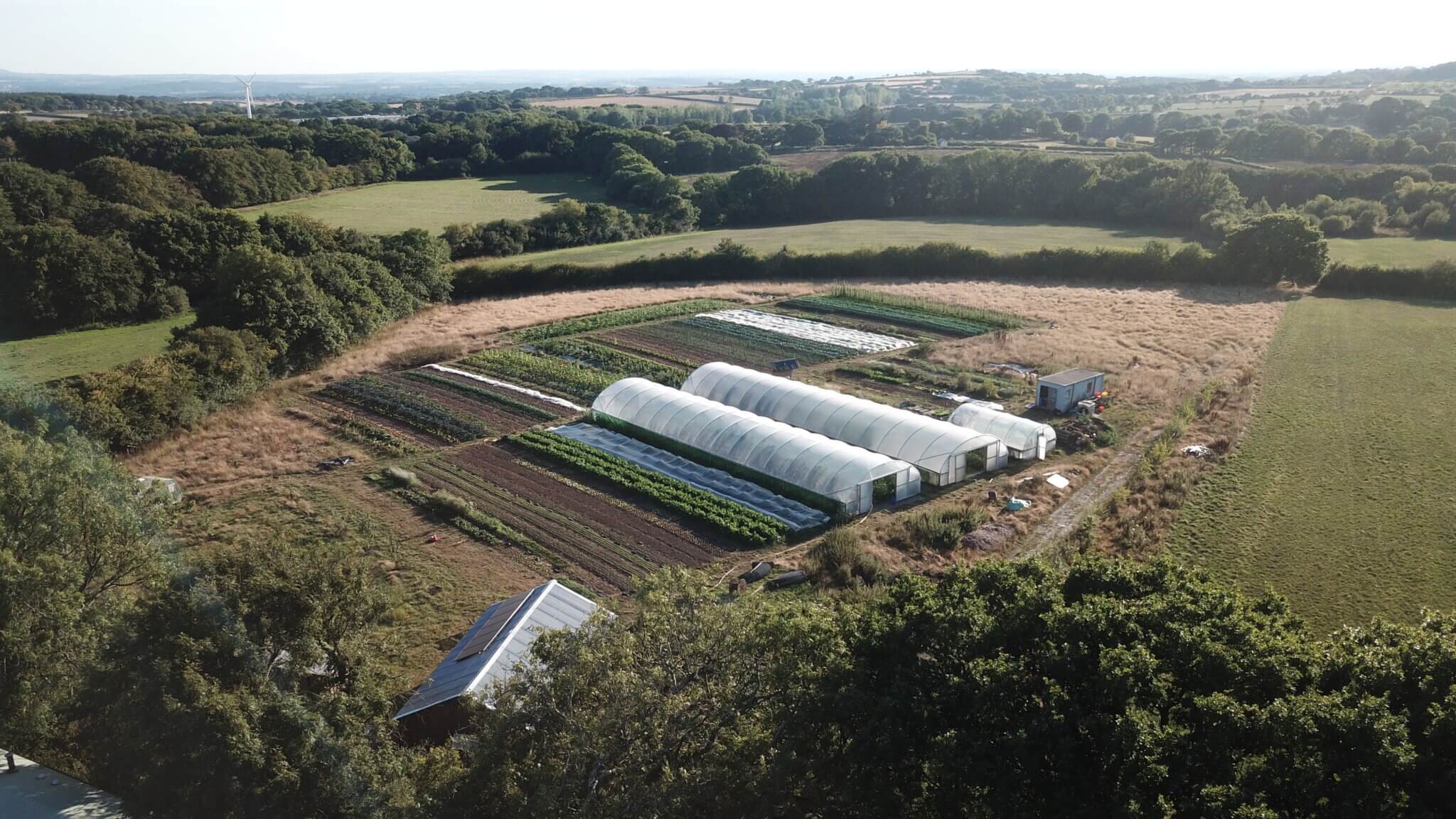


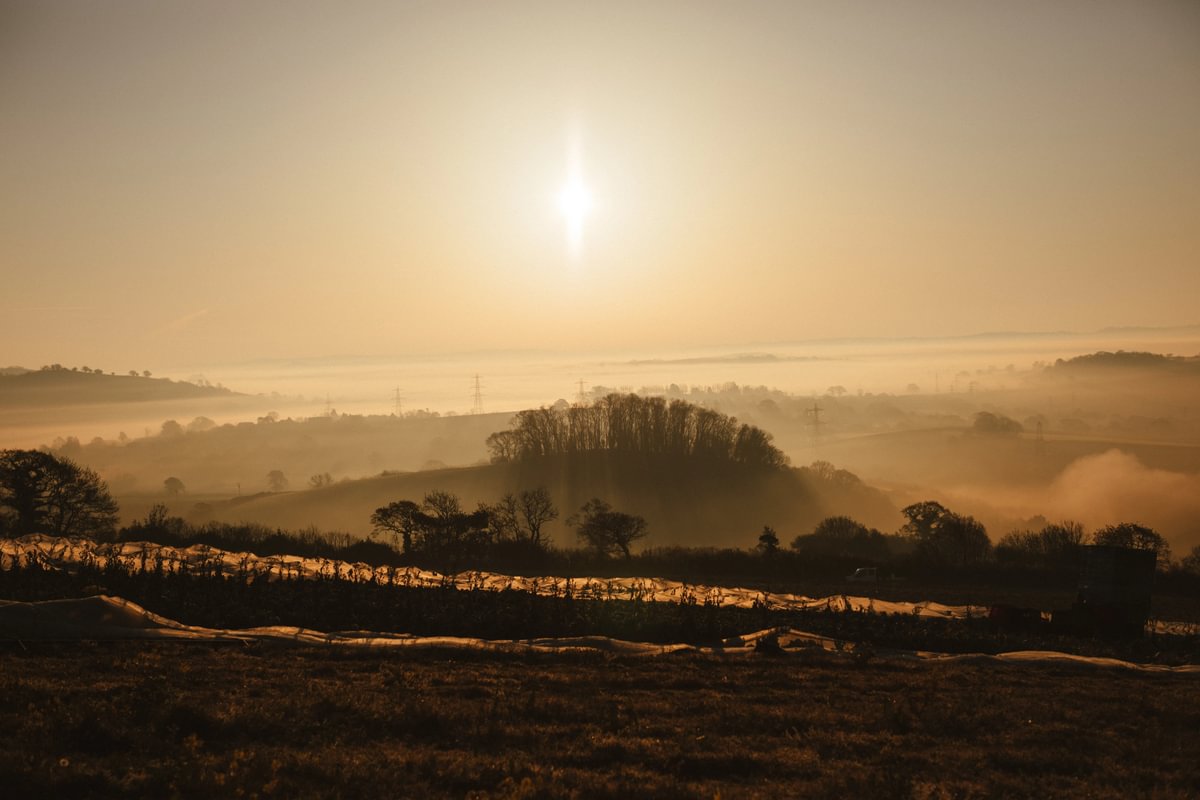




A well written and insightful piece.
Food security and affordability could be well served by small and local market gardens.
That the business model of Liv and Henry at Down Farm proved unsustainable, suggests culpable failure of govt food policy and market regulation. Public expectation of affordability, as well as govt policy and regs may also be a factor.
The recent announcement of a govt platform for digital driving licences and passports, may also become the means for future food rationing in a market that has failed to produce and distribute sufficient veg, flour, cereals, and fruit to meet our needs, let alone desires.
I don’t really have anything to say. I feel you were so brave to do what you did. It’s a shame that the gov’t doesn’t support growers like you who are producing real food for people. But also that people who can pay still flock to supermarkets to buy ‘cheap’ food.
This situation saddens me but I wish you well in your new work and know things will work out for you.
Every blessing
Your honesty and courage in sharing your journey is deeply moving and will undoubtedly resonate with so many others facing similar challenges. The fact that you are able to reflect on your success in terms of the positive impact you’ve made—on the environment, the community, and the quality of the food you’ve grown—speaks volumes about your integrity and values. It’s heartbreaking that the current system has made it so difficult for you to sustain what should be one of the most essential and valued professions.
Your determination to keep working in food, despite the challenges, is inspiring, and I have no doubt that you’ll find a new way to make an impact.
. Wishing you both strength and success as you transition—you’ve already proven that your work and passion are invaluable.
Very well written and amazing reflection at what must be a painful time. Thank you for sharing your experience and thoughts. I sometimes wonder if, as a nation, we should insist everyone, at some point in their lives, has some experience of food growing. It might educate on the real cost of food (widest sense not just monetary), but potentially also give wider benefits – health, exposure to different ways of life and being outside. Best wishes for the future.
Alas all your hard work, investment and ideals have more than amply illustrated the fact that in “Business Terms” – what Matters is the Bottom Line. and it’s Business & the Bottom Line that rule (at least at the moment)
The trouble is that Business only knows the Price of things, not the Value. And if things are Valuable but “Price-less” then they are just not counted, or valued. Thus Business, & too often Government, can’t be arsed to significantly change things.
It’s akin to the way children at school are repeatedly tested – so that Schools can be ‘Ranked’ to show which are ‘The Best’.
Meanwhile 1 in 5 children, occasionally 1 in 4, are leaving Primary School more or less functionally illiterate. Now reducing those appalling stats would definitely be a better measure of the ‘success’ of a Primary School, but that would cost more money. & according to Those In Charge – money is in Very Short Supply.
Hmmmmm!
A shame that you weren’t nearer to a denser population where even just the 5% would have been an ample & hungry market.
You deserved an improving future having produced the best in quality at a large cost to your pockets & wellbeing.
Respect for all your work and trying. I find it deeply disappointing that after all the effort the business is not viable and I dont fully comprehend it – I understand that basically a certain amount of labour is required but an insufficient quantity of food is produced/or the ‘value’ of that produce is not enough to pay all the expenses – I can understand why you had to leave it and it is sad.
Thanks for writing about your experiences, and first I want to wish you good luck with your career moves.
Second – (the answer needs to remain confidential, but the q arises anyway & all may benefit from asking it) –
why are you, the younger generation, burdened with inheritance issues and legal fees?
Families need straightforward financial advice, far-sighted family trust arrangements.
Rachel Reeves knows this and farmers can focus their campaign on the fact that she’s set the bar FAR TOO LOW.
Thirdly, bear in mind that this neck of the woods (where we lived for over 25 years) was traditionally allocated to small mixed farms. Prosperity was never great but strength lay in the land’s capacity to grow “a bit of everything”, slow food, hardy breeds of cattle browsing the hedgerows and holloways, resilient orchards, resources drawn from & feeding back into immediate surroundings.
Your beautiful market garden evolved its niche on too small a pocket of land, and as you commented already, you’re up against the supermarkets.
But smallholders are islands amid a conglomerate-driven farming industry, which grew big and fat after WW2 using ploughed-up watermeadows, ex munitions-factory chemicals, advice from the Min of Ag about what would sell once rationing was lifted: the focus being on meaty sugary refined diets.
(4) These agribusinesses and opportunist estates watch the small mixed farms face bankruptcy without compunction. One by one the old acres get subsumed into property folios whose accountants assign arable to fodder for rapidly fattening animals, so they can raise the rent, not so they can produce foods we directly eat. Defra and the NFU welcomed the backup of EU subsidy schemes, however inappropriate for the locale, and despite all our protests they’re still presiding over irreversible pollution & destruction at scale. The national diet – as well as its water, air and topsoil – is in far worse condition than before this industrialisation.
What Guy Singh-Watson and his family and co-op venture have achieved looks like a defiant kickback against this process. Let’s acknowledge, however, that Riverford’s in a somewhat more prosperous district and it built upon the work of the earlier generation.